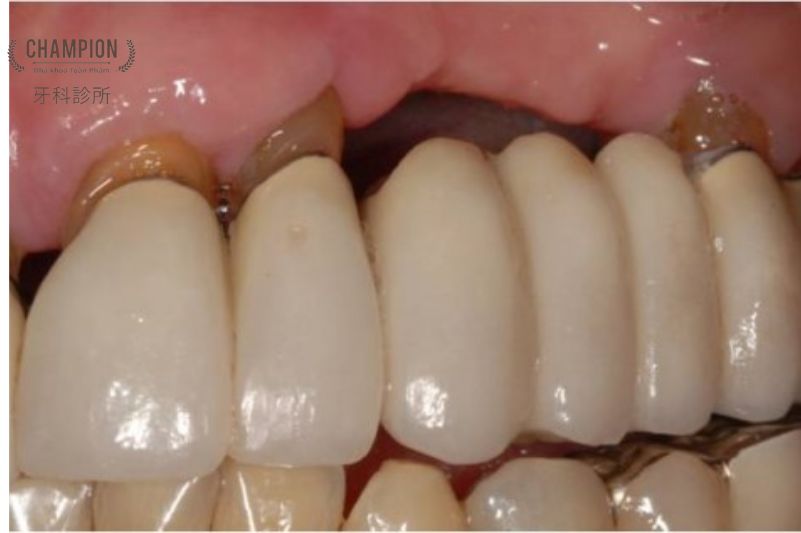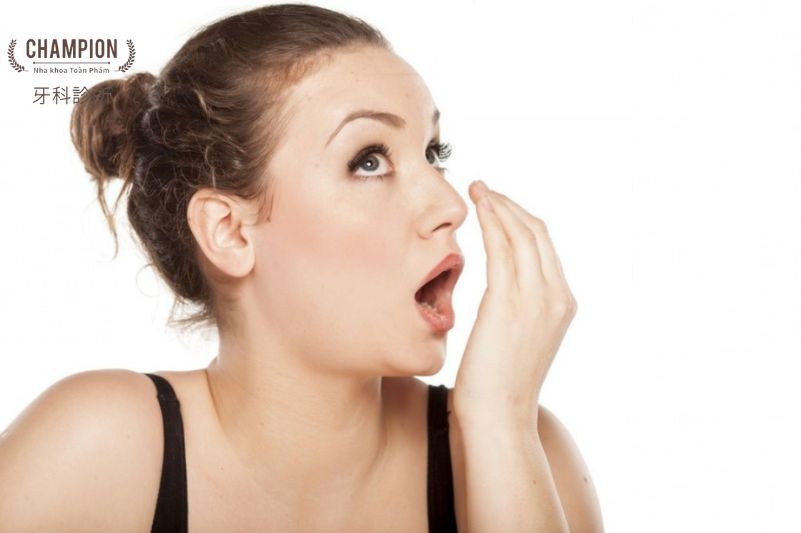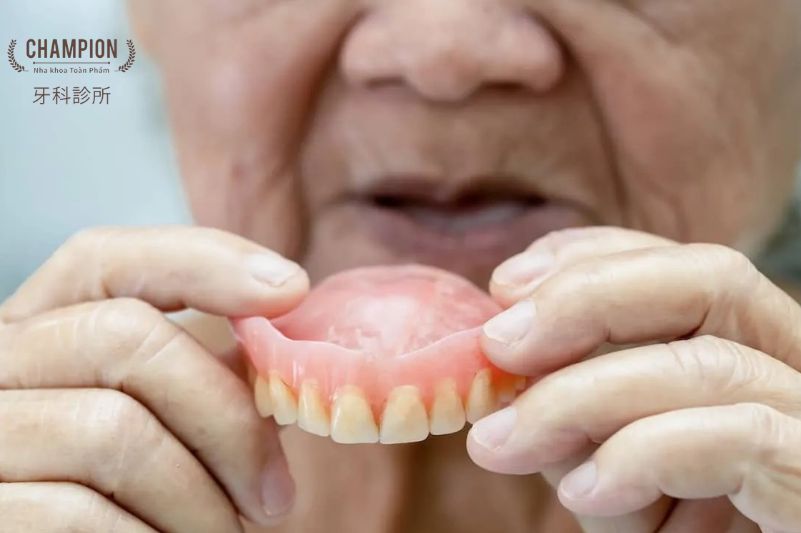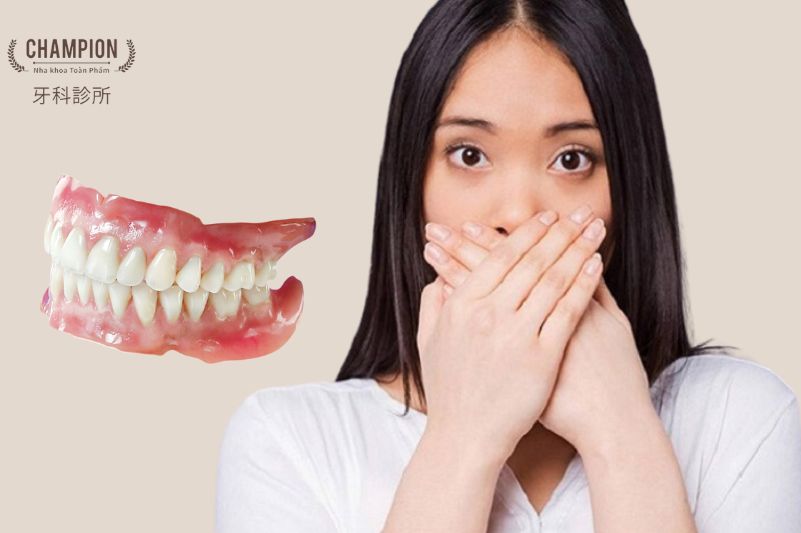Bad breath is a fairly common issue for denture wearers. According to statistics from the American Dental Association, up to 65% of denture wearers experience unpleasant bad breath. Bad breath causes discomfort, self-consciousness, and can even lead to severe infections.
So is bad breath really caused by dentures? What are the reasons and how can it be resolved? Let’s explore these questions through the article below!
Causes of denture-related bad breath
Bad breath caused by dentures originates from several different reasons. Here are the 3 main causes of this condition:
Food stuck in dentures
Food deposits left in dentures for a long time without cleaning become an ideal environment for bacteria to develop. The bacteria will decompose the food creating foul compounds that cause oral odor.
Bacteria accumulation in dentures
Bacteria are always present in the oral cavity, even for those with good immune systems. However, when concentrations rise excessively in dentures due to poor hygiene, they generate foul smelling volatile compounds causing bad breath.
Improper denture cleansing
Many denture wearers use improper cleansing techniques or do not clean frequently enough. This allows odor causing agents to adhere to and propagate on dentures. The result is constantly foul smelling breath, which severely impacts lifestyle and social interactions.

Symptoms of denture-related bad breath
Denture wearers may experience several problematic symptoms indicating the presence of bad breath:
- Persistent foul, rotten egg-like breath odor - As volatile sulfur compounds produced by bacteria accumulate in saliva and dentures, breath takes on an unpleasant smell noticeable to others during speech and laughter. This causes social embarrassment.
- Constant unpleasant taste sensations - Tongue contact with foul-smelling dentures imbues a bad taste. Sense of taste is dulled by lingering putrid flavor, affecting appetite and enjoyment of meals.
- Accumulation of thick yellowish-brown stains and debris on dentures - Food particles, bacteria colonies and biofilm acids stain and discolor pink acrylic resin over time. This buildup provides sustenance for further bacterial growth.
Do not ignore these conspicuous signs. They denote microbial overpropagation and require timely intervention to halt progression.

Serious complications of leaving denture halitosis untreated
Prolonged exposure to an oral microbial imbalance can lead to inflammation, tissue damage and vulnerability to more severe secondary infections:
- Swollen, bleeding inflamed gums with widening periodontal pockets - Toxins from excessive pathogenic oral bacteria irritate and break down gum tissue structure. This accelerates bone loss and loosens remaining natural teeth.
- Enamel decalcification and dental caries - Acids in denture plaque lower mouth pH enabling subcgingival bacteria to demineralize and penetrate enamel. These bacteria further infect the tooth pulp.
- Oral microbes spread systemically causing gastrointestinal inflammation - Hematogenous dissemination of oral pathogens to the gut lining leads to inflammation, ulcers, poor nutrient absorption and symptoms like diarrhea, nausea and vomiting.

>> See more: Gum inflammation: Symptoms, causes, and treatments
How to treat denture-related bad breath
To completely eliminate the uncomfortable condition of bad breath, it is important to apply the following measures together:
Properly clean dentures
- Use a toothbrush and cotton swabs to clean between teeth gaps and ridges of the dentures.
- Soak dentures in a disinfecting, deodorizing dental solution for at least 30 minutes.
- Rinse with saline solution to remove plaque and bacteria.
Saline mouth rinse
Saline solution has disinfecting properties and effectively cleans the oral cavity. Rinsing with saline after brushing helps eliminate odors caused by bacteria.
Treat the underlying causes of bad breath
If bad breath originates from other conditions like gum disease, dental cavities, orthodontic appliances, etc. it is crucial to treat these diseases thoroughly. Antibiotics and anti-inflammatory medication may be prescribed if necessary.

How to Prevent Denture-Related Halitosis
To prevent bad breath caused by dentures, proper and consistent oral hygiene is extremely important. Additionally, you should note:
Practice appropriate oral care
After brushing, you should rinse with saline mouthwash to completely eliminate residue and odors. Use dental floss to clean between teeth gaps and difficult to reach areas. Always clean both dentures and natural teeth properly twice daily - morning and night before bed.
Get dental checkups every 6 months
Biannual dental visits enable dentists to comprehensively examine the mouth, detect and promptly treat any diseases. You will also receive tailored advice on optimal oral hygiene suited for your oral physiognomy.
Replace old dentures within recommended time frame
Dentists advise that dentures should be replaced with new sets every 3-5 years to prevent loosening, damage and aesthetic deterioration. This also helps preclude recurrence of malodor.
Champion Dental Clinic - The leading reputable denture provider
Champion Dental Clinic is renowned as one of the most trusted and highest quality denture providers in Vietnam. With extensive experience in dentures and an excellent team of highly skilled doctors leveraging state-of-the-art facilities, Champion provides the utmost safe and effective service.
Notably, Champion partners with globally recognized premium denture brands. This helps patients select the solutions best matching their needs and budget. For those seeking replacements, visit Champion Dental for thoughtful care and dedicated service.
Conclusion
Bad breath from dentures is fairly widespread, severely impacting lives and wellbeing. To resolve it requires properly combining hygiene, treatment and periodic replacements. Hopefully the guidance above provides helpful knowledge on addressing denture halitosis.
Vietnamese & English: (028) 5411-2295
中文: (028) 5411-2297 172 Nguyen Luong Bang, Tan Phu Ward, District 7, Ho Chi Minh City.
Fanpage: Champion Dental Clinic 牙科診所
Zalo: Champion Dental Clinic
Youtube: Champion Dental Clinic 牙科診所
 Champion Dental Clinic
Champion Dental Clinic



